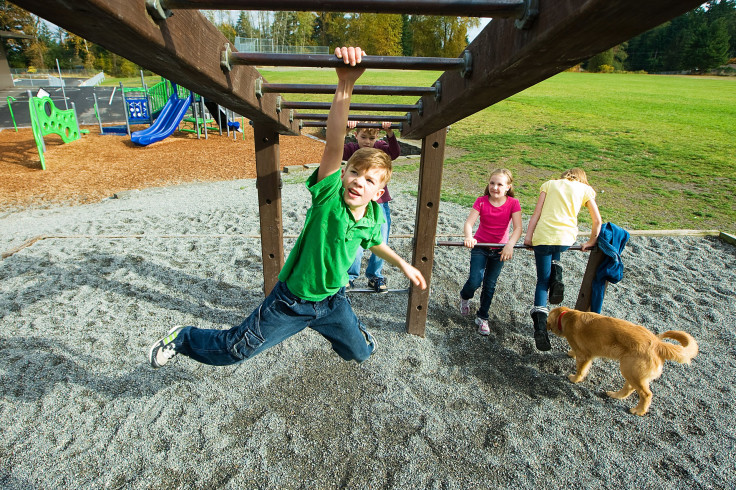Kids Enjoy Exercise More When They Do It With Friends, Don't Feel As Self-Conscious

Peer influence is so strong during childhood and adolescence that much is understood based on our personal experiences. From toys to makeup, and sports to first kisses and condoms, friends are the pace makers of growing up. Researchers from the Cincinnati Children’s Hospital Medical Center recently took a deeper look into peer-to-peer interaction and discovered how a child’s friend can impact his health.
"We speculate that the social network of friendships is increasingly important in influencing behaviors as children get older," the study’s lead author Dr. Jessica Graus Woo, an associate professor of pediatrics at Cincinnati Children's Hospital Medical Center, said in a press release. The new findings were published in the journal Circulation and presented at the American Heart Association’s Epidemiology/Lifestyle Scientific Sessions.
"Having physically active friends may make it easier for obese children to get involved with activities and lower the perceived barriers for doing so, while having a physically active family may not be as inspiring," Woo added.
Currently, there isn’t enough data on the obstacles and motivators to getting a child the exercise he needs, according to the research team who interviewed 104 children and adolescents on their opinion. Roughly half of the participants were white and 74 percent were female, with an average age of 12.5 years old. Researchers gave them a list of exercise benefits and barriers and asked the kids to rank them and note whether or not their friends or family got involved.
Friends with Health Benefits
It turns out the No. 1 one factor holding kids back from exercising is feeling self-conscious. They also found exercise wasn’t enjoyable, they felt their health was too poor to participate, thought they lacked self-discipline, and lacked energy. Children 12 years and older reported more often they lacked time, enjoyment, and were even afraid they’d injure younger kids.
But as soon as a kid noted their friend was involved, they marked down significantly fewer barriers, such as lack of interest, energy, enjoyment, equipment, skill, health, and knowledge. Families were encouraging 78 percent of the time but weren’t participating as much, and children didn’t report they cared. It was their friends who changed the way they felt about exercise. All of a sudden it was less of a challenge than when they had to face it alone. Let’s be realistic, who really wants to ride a swing or hang off a monkey bar without a friend?
Regular physical activity and a balanced diet are the fundamental keys to fighting the childhood obesity epidemic. In the last 30 years, obesity has more than doubled in children and tripled in adolescents, according to the Centers for Disease Control and Prevention. The CDC reports a child’s behavior is widely influenced by his family, community, school, child care settings, medical providers, places of worship, the media, the food and beverage industry, and the entertainment world. However, the CDC fails to list the impact of friendship.
"Clinically, much of the focus on increasing physical activity involves engaging the family and encouraging the patient to be more active, but this study suggests that encouragement may not be sufficient," Woo said. "Clinicians may also need to consider how to get children to be active with their friends."
Source: Woo JG. Circulation. 2015.



























